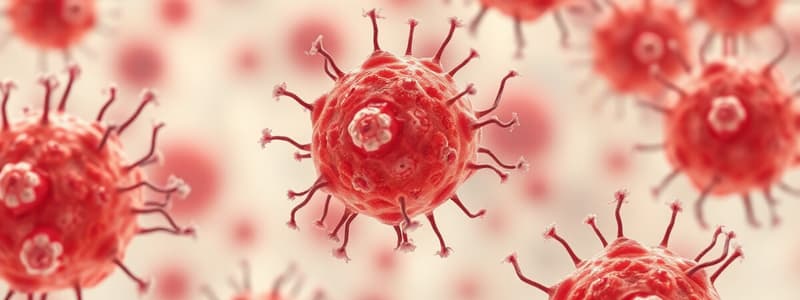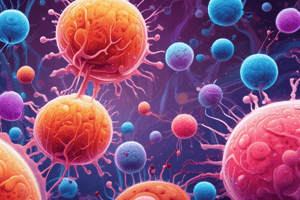Podcast
Questions and Answers
What role does interferon gamma (IFNγ) play when secreted by NK cells?
What role does interferon gamma (IFNγ) play when secreted by NK cells?
- It stimulates the production of cytotoxic T cells.
- It protects nearby cells from viral infection. (correct)
- It activates B cells to produce antibodies.
- It enhances the ability of macrophages to ingest pathogens.
Which cells serve as the primary interface between the innate and adaptive immune systems?
Which cells serve as the primary interface between the innate and adaptive immune systems?
- NK cells
- Dendritic cells (correct)
- Macrophages
- B cells
Which statement correctly defines T helper (Th) cells?
Which statement correctly defines T helper (Th) cells?
- They activate B cells and macrophages for immune responses. (correct)
- They are involved in the direct killing of virus-infected cells.
- They primarily produce antibodies in response to antigens.
- They represent the first line of defense against infections.
What is the primary function of B cells in the immune response?
What is the primary function of B cells in the immune response?
Which marker identifies T helper cells?
Which marker identifies T helper cells?
How do CD8+ T cells acquire cytotoxic granules?
How do CD8+ T cells acquire cytotoxic granules?
Which type of lymphocyte matures in the bone marrow?
Which type of lymphocyte matures in the bone marrow?
What is the main function of T regulatory cells (Tregs)?
What is the main function of T regulatory cells (Tregs)?
What is the primary function of neutrophils?
What is the primary function of neutrophils?
Which component is specifically involved in opsonization?
Which component is specifically involved in opsonization?
What role do macrophages play in the immune system?
What role do macrophages play in the immune system?
Which type of cell is primarily responsible for immediate hypersensitivity reactions?
Which type of cell is primarily responsible for immediate hypersensitivity reactions?
How do NK cells function in the body?
How do NK cells function in the body?
What triggers the process of exocytosis in mast cells and basophils?
What triggers the process of exocytosis in mast cells and basophils?
What type of molecule do mononuclear phagocytes use to bind to opsonins?
What type of molecule do mononuclear phagocytes use to bind to opsonins?
What is the key difference between basophils and mast cells?
What is the key difference between basophils and mast cells?
What role do macrophages play in the interaction between innate and adaptive immunity?
What role do macrophages play in the interaction between innate and adaptive immunity?
What type of immunity do B lymphocytes primarily contribute to?
What type of immunity do B lymphocytes primarily contribute to?
How do complement components become activated in the context of immune responses?
How do complement components become activated in the context of immune responses?
What is the primary function of cytotoxic T cells in the adaptive immune response?
What is the primary function of cytotoxic T cells in the adaptive immune response?
What is the significance of cytokines and chemokines in the immune response?
What is the significance of cytokines and chemokines in the immune response?
What distinguishes T-cell dependent B cell activation from T-cell independent activation?
What distinguishes T-cell dependent B cell activation from T-cell independent activation?
What role do toll-like receptors (TLRs) play in B cell activation?
What role do toll-like receptors (TLRs) play in B cell activation?
What is the primary function of plasma cells?
What is the primary function of plasma cells?
How do naive B cells recognize antigens?
How do naive B cells recognize antigens?
Why do plasma cells have a high content of rough endoplasmic reticulum (RER)?
Why do plasma cells have a high content of rough endoplasmic reticulum (RER)?
What is the role of antigen-presenting cells (APCs) in T-cell activation?
What is the role of antigen-presenting cells (APCs) in T-cell activation?
What triggers the expansion and differentiation of B and T cells during clonal selection?
What triggers the expansion and differentiation of B and T cells during clonal selection?
What is the significance of B cell receptors (BCRs) in the immune response?
What is the significance of B cell receptors (BCRs) in the immune response?
Flashcards are hidden until you start studying
Study Notes
Phagocytes
- Phagocytes, including neutrophils and macrophages, function as specialized "eating" cells.
- Neutrophils are mobile leukocytes that represent the majority of blood leukocytes and feature multilobed nuclei; also known as polymorphonuclear cells (PMNs).
- Neutrophils contain granules with peroxidase, phosphatases, and defensins for microbial killing and respond to chemotactic factors released by microbes.
- Macrophages are phagocytic cells derived from monocytes, with specialized versions in different organs and tissues.
Phagocytosis and Opsonization
- Opsonization enhances the ability of phagocytes to engulf microbes by coating them with "opsonins."
- Opsonins, such as C3b and antibodies produced by B cells, aid in microbe attachment and phagocytosis activation.
- Mononuclear phagocytes use surface receptors to bind to opsonins, facilitating phagocytosis.
Mast Cells and Basophils
- Mast cells are tissue resident cells crucial for immediate hypersensitivity reactions.
- Basophils circulate in the blood but migrate to sites of allergic inflammation during late-phase responses.
- Both cell types have large granules that release contents via exocytosis, which is vital for acute inflammatory responses.
Natural Killer (NK) Cells
- NK cells are important in the defense against viruses and cancer and are found mainly in circulation.
- They target infected cells by recognizing altered surface molecules, inducing apoptosis, and secreting interferon gamma (IFNγ) to protect nearby cells.
Dendritic Cells
- Dendritic cells bridge the innate and adaptive immune systems, with membrane folds resembling nervous system dendrites for enhanced cell interaction.
- They recognize microbial antigens and initiate adaptive responses by processing and presenting antigens to T-helper (CD4+) cells.
Adaptive Immune Cells
- Lymphocytes, primarily T and B cells, develop in the thymus and bone marrow, respectively.
- T cells include T helper (Th), T cytotoxic (Tc), and T regulatory (Treg) cells, with distinct functions and markers.
- TCRs determine the specificity of T cells, while CD3 is essential for their activation.
T Helper and Cytotoxic T Cells
- T helper cells activate B cells for antibody production and help cytotoxic T cells target infected cells.
- Cytotoxic T cells (CD8+) require activation via specific antigens to acquire cytotoxic granules for targeting infected cells.
B Cells and Humoral Immunity
- B cells function in humoral immunity by differentiating into plasma cells upon encountering antigens, producing antibodies.
- Each B cell has unique antigen receptors to generate diversity for recognizing various environmental antigens.
- B-cell activation can be T-cell independent (producing IgM and no memory B cells) or dependent (producing memory and plasma B cells).
Clonal Selection and Antigen Presentation
- Clonal selection identifies B and T cells with receptors for specific antigens, stimulating their expansion.
- B cells recognize native antigens, while T cells need antigens presented on MHC molecules by antigen-presenting cells (APCs), like dendritic cells and macrophages.
Interaction Between Innate and Adaptive Immunity
- Innate and adaptive immune systems coordinate closely, responding to infections collaboratively.
- Macrophages not only phagocytose pathogens but also produce cytokines that enhance adaptive responses.
- Both immune systems interact through direct cell contact and signaling molecules, with T and B lymphocytes maturing under distinct influences and producing cellular and humoral immunity, respectively.
Studying That Suits You
Use AI to generate personalized quizzes and flashcards to suit your learning preferences.




